外研版高中英语必修二Module 4 Fine Arts – Western, Chinese and Pop Arts Grammar(共63张 )
文档属性
| 名称 | 外研版高中英语必修二Module 4 Fine Arts – Western, Chinese and Pop Arts Grammar(共63张 ) | 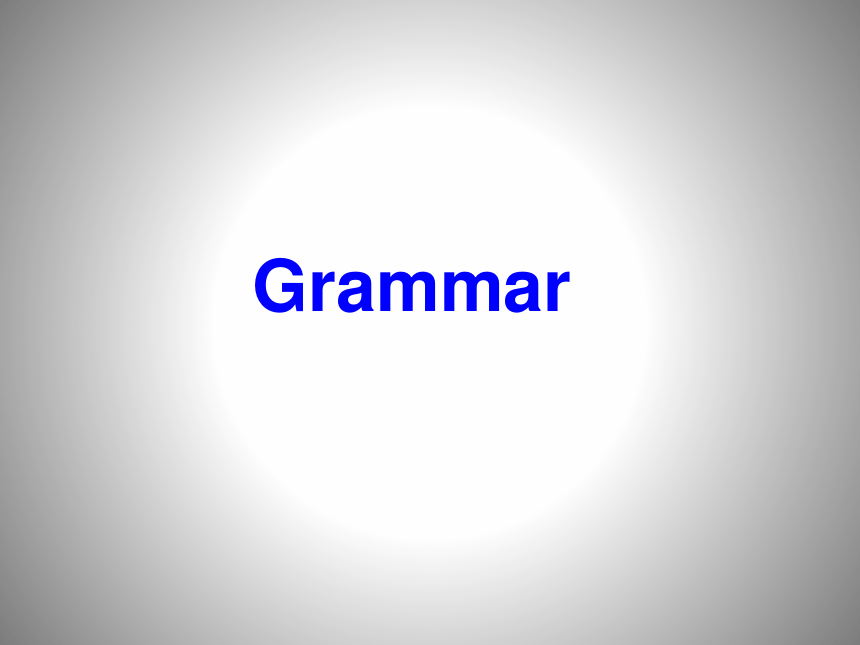 | |
| 格式 | zip | ||
| 文件大小 | 153.6KB | ||
| 资源类型 | 教案 | ||
| 版本资源 | 外研版 | ||
| 科目 | 英语 | ||
| 更新时间 | 2018-03-22 11:04:32 | ||
图片预览



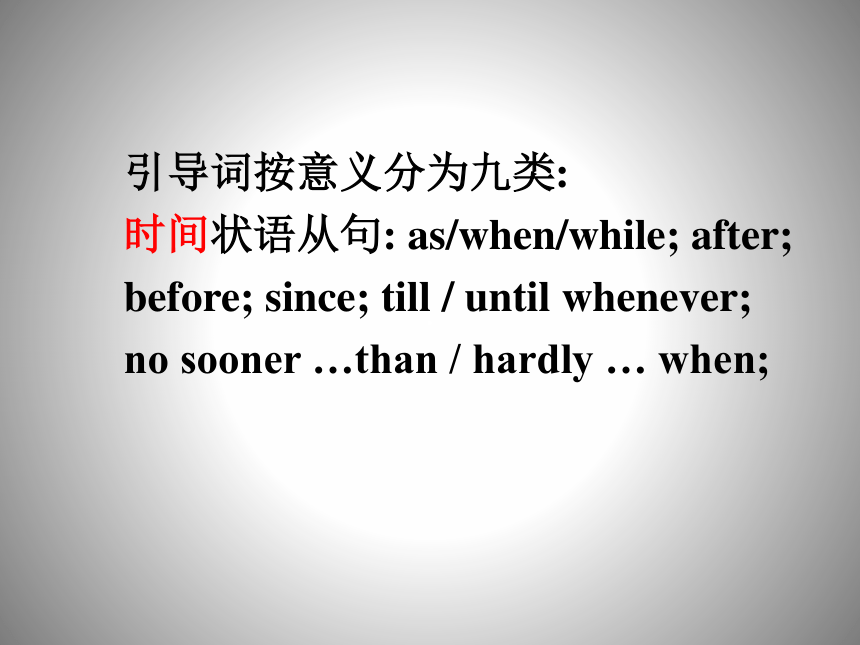
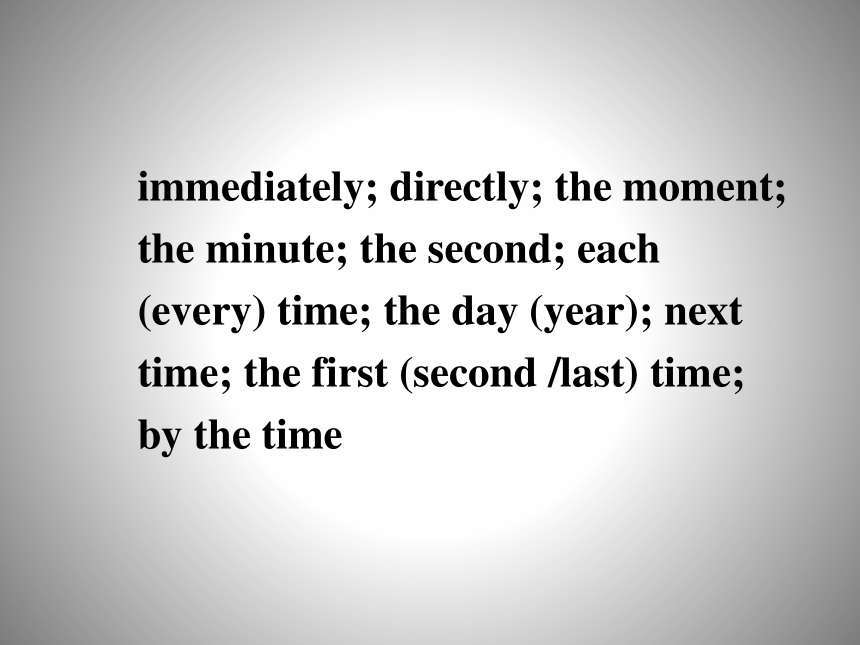
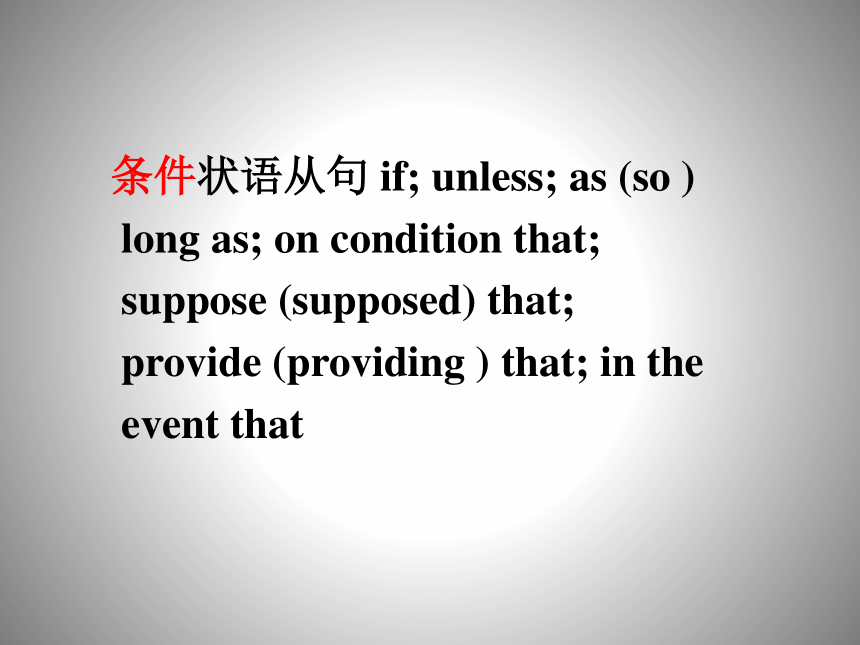

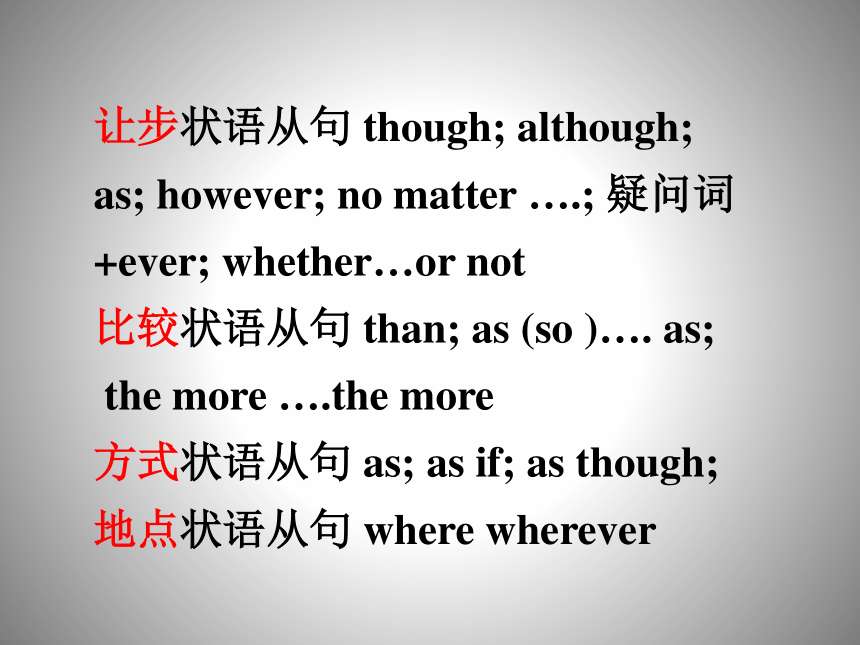

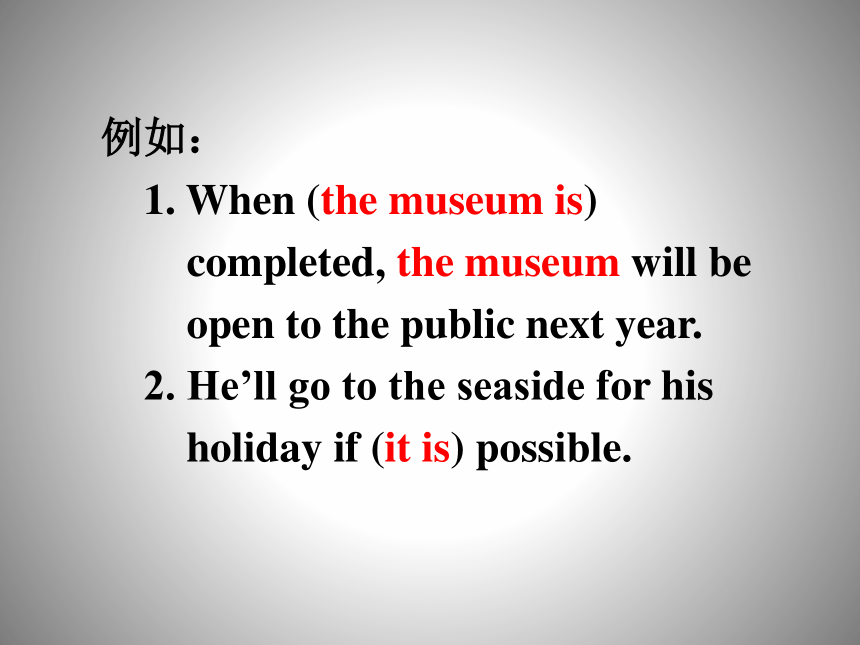
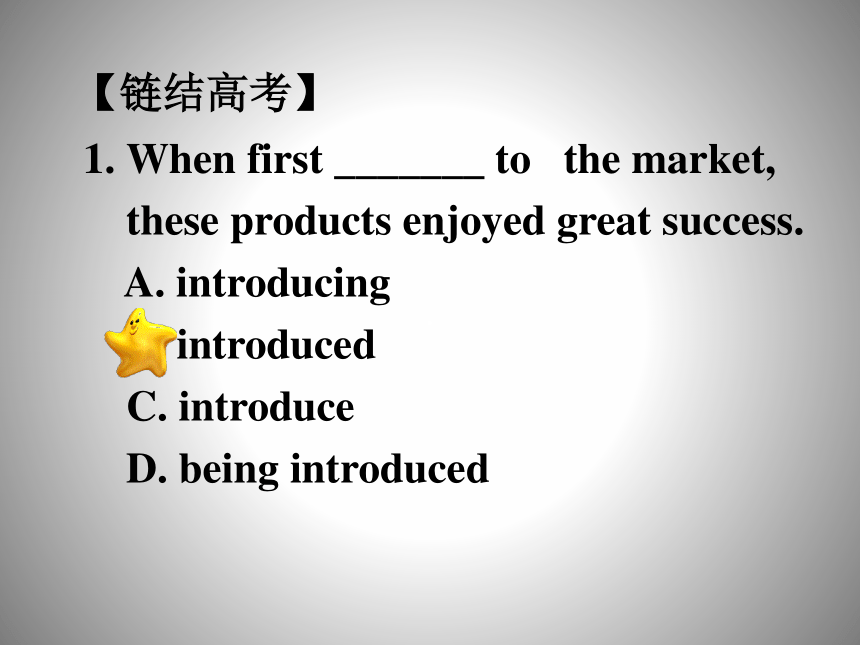
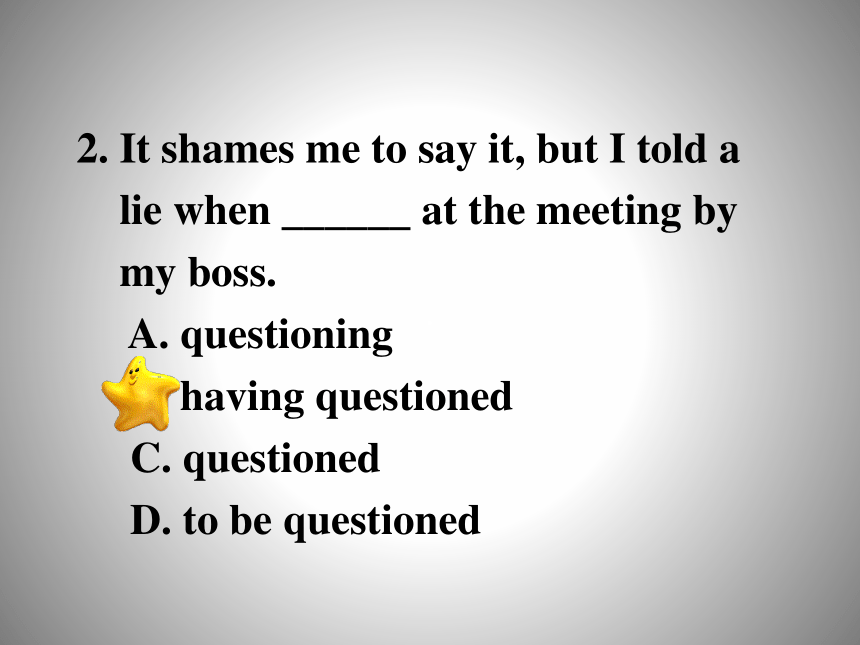
文档简介
课件63张PPT。Grammar1. Adverbial clauses: having done
Having lost all my old friends, I
felt shy and lonely at my new
school.
2. Verbs followed by –ing and the
infinitive with to remember,
forget, stop, go on, regret状语从句按意义可分为时间状语从句、条件状语从句、地点状语从句、原因状语从句、目的状语从句、让步状语从句、结果状语从句和比较状语从句。状语从句由从属连词引导。引导词按意义分为九类:
时间状语从句: as/when/while; after; before; since; till / until whenever; no sooner …than / hardly … when;immediately; directly; the moment; the minute; the second; each (every) time; the day (year); next time; the first (second /last) time; by the time 条件状语从句 if; unless; as (so )
long as; on condition that;
suppose (supposed) that;
provide (providing ) that; in the
event that 原因状语从句 because; as; since; now (that )
结果状语从句 so (such )… that ….
目的状语从句 so that; in order that; in case 让步状语从句 though; although;
as; however; no matter ….; 疑问词
+ever; whether…or not
比较状语从句 than; as (so )…. as;
the more ….the more
方式状语从句 as; as if; as though;
地点状语从句 where wherever状语从句的省略
状语从句同时具备下列两个条件:
①主句和从句的主语一致,或从
句主语为it;
②从句主要动词是be的某种形
式。从句中的主语和be动词常
可省略。例如:
1. When (the museum is)
completed, the museum will be
open to the public next year.
2. He’ll go to the seaside for his
holiday if (it is) possible. When first _______ to the market, these products enjoyed great success.
A. introducing
B. introduced
C. introduce
D. being introduced 【链结高考】2. It shames me to say it, but I told a
lie when ______ at the meeting by
my boss.
A. questioning
B. having questioned
C. questioned
D. to be questioned状语从句和状语的转换:
状语从句主语和从句一致时,转换为分词短语。
After he turned off the recorder, he went out of the room.?
Having turned off the recorder, he went out of the room.When the city is seen from the mountain, it looks much more beautiful ?
Seen from the mountain, it looks much more beautiful.状语从句主语和从句不一致,转换为独立主格结构。
If weather permits, we’ll have the meeting in the open air. ?
(With) Weather permitting, we’ll have the meeting in the open air. 状语从句转换为介词短语:
由after/before/ since/ as soon as等引导的时间状语从句,可改为after/before/ since/on+动名词短语结构。当主从句主语不一致,可使用动名词的复合结构。Before he dived into the lake, he made a deep breath.
?Before diving into the lake, he made a deep breath. 状语从句转换为动词不定式短语。
He is so strong that he can lift the heavy stone.
?He is strong enough to lift the
heavy stone.
He was so weak that he couldn’t go a step further.
?He was too weak to go a step
further.He stood in the front of the classroom in order that he could see the picture clearly.
?He stood in the front of the classroom in order to (so as to /to) see the picture clearly.Grammer 1:
Adverbial clauses: having done Having lost all my old friends, I felt shy and lonely at my new school.Part 1Exercises:Having left something in the
cloakroom, I went inside to get it.That weekend, having thought
about the situation for a while,
I decided to ask Roy about that
theft.Do the words in red refer to the
present or the past?
Answer: Past.
2. Do the two parts of each sentence refer to the same person?
Answer: Yes.1. Having known Roy for years,
2. Having discussed a very
personal matter,Part 3Match the two parts of the
sentences.3. Having chatted together two or
three times,
4. Having been shy and lonely when
I arrived at the new school, a. I felt I was getting to know him.
b. I hope he would not tell anyone.
c. I was very happy when I made
some good friends.
d. I did not expect him to behave
like him.Answer: 1--d; 2--b;
3--a; 4--c_______ counted the money, Mr White put it in the box. The key to the box had ____ lost long ago, but Mr White ____ not worried. “___
put it in my locker,” he thought, “It’ll be quite safe Part 5 Complete the passage.HavingbeenbeenI’llthere.” Having _______ of this, he put the box under his arm and walked over __ talk to some of the older boys. “Well done!” he said, —________ to the box, “there is 500 in here!”
_____ chatting for some minutes, thoughttopointingAfterhe went to his desk to _____ for
some papers and found them
underneath some books. He was
looking through them ____ a boy
put his head round the door and
said,“ Mr White, your wife is onlookwhenthe phone. She needs to speak to you ___________.” Mr White jumped __ and went out of the room, having ________ all about the box. ___ returning to his desk, he found it had gone.immediatelyupforgottenOnGrammer 2:
Verbs followed by –ing and the infinitive with to
remember, forget, stop, go on, regretdoing和to do都具备名词的功能,在句子中作主语、宾语、表语等,区别如下:
doing表示状态、性质、经常性; to do表示具体的、一次性的、将发生的动作。agree, ask, aim, arrange, choose,
decide, demand, expect, fail, help,
learn, long, manage, offer, plan,
prepare, pretend, promise, refuse, wish以下动词后,只能跟不定式做宾语:admit, appreciate, consider, delay,
enjoy, finish, keep, imagine, mind,
miss, practice, resist, risk, save,
suggest, don’t mind, give up,
insist on, put off以下动词后,只能跟-ing做宾语:在下列一些动词后,即可接doing形式也可接to do形式,但意义有所不同:在need, require, want后接-ing形式,表示被动意义,也可接不定式, 但要用被动形式; hate, love, like接不定式表示特定的未来事件, 接-ing形式表示目前正在进行的活动或一般的行为。1)hate, like, love前有would/should
时
2)当谓语动词begin, continue, start
等是进行式时
3)begin, continue, start与know,
understand等状态动词连用时在下列情况下,一般要用不定式:forget, remember, regret to do
表示现在或未来的动作;
forget, remember, regret doing
表示动作已经发生。
mean to do表示打算、想要做;
mean doing表示意味着。 go on to do
表示做不同的事或不同内容的事;
go on doing
表示继续不停的作某事。
cease to do
表示长期甚至永久性的停止作某事;
cease doing
表示短暂停止作某事。forget, remember, regret to do
表示现在或未来的动作;
forget, remember, regret doing
表示动作已经发生。
mean to do表示打算、想要做;
mean doing表示意味着。1. I remember __________ her for the
first time.
Key: meeting
2. You must remember __________ in
touch.
Key: to keep EXERCISES:Part 13. I regret _________ that now.
Key: doing
4. I regret _________ that I have lost
touch with four or five friends.
Key: to sayregret vt -tt- 遗憾;抱歉
I regret spending so much money on
a car.
我后悔在一辆小汽车上花这么多钱。
I regret to say I cannot come.
很抱歉,我不能来了。I regret (to say) that...
我很遗憾...
It is to be regretted that ...
使人遗憾的是..
I regret my ignorance on the subject.
我很遗憾, 对此问题一无所知。I regret to tell you that my friend is ill. 遗憾地告诉你, 我的朋友病了。
To this day I do not regret having
made that remark.
说了这话, 我至今不后悔。
He died regretted by all.
他死了, 大家深感痛惜。 n. 悔恨;痛惜
He told me with regret that he
could not come to the party.
他很抱歉地对我说他不能来
参加这个聚会了。
(pl) 婉言辞谢
to send one’s regrets 送出辞谢的回帖
have no regrets 没有遗憾Remember ______________(keep in
touch) when you go away. Email me!
Key: to keep in touch
2. Do you remember ________(go) to
school for the first time? Did you
feel shy?
Key: goingPart 43. I never forget ________(phone) my
parents when I’m away from home.
Key: to phone
4. I’ll never forget ________(say) that
it was stupid of me. I really hurt my
friend.
Key: saying5. I regret ________(tell) you that
you will not be in the same class
as your friends.
Key: to tell
The joke was really funny and
the two girls couldn’t stop ______
(laugh)
Key: laughing7. I walk home from school with a
friend. We often stop _____ (buy)
some sweets.
Key: to buy
8. I didn’t like Chen at first but we
went on ________(become) good
friends.
Key: to become9. First we discussed our families,
then we went on ________(talk
about) personal matters.
Key: to talk aboutI met Li Bei for the first time
when I was six years old. Her
family lived on the same floor as
us, and I remembered seeing a
pretty little girl was going in and out of the next door flat. Part 5 Complete the passage.I was an only child and really want
someone to play with. One day Li Bei
was playing with her dolls outside her flat when my mother and I arrived at our front floor. When she saw us she stopped
playing and my mother laughed
and said, “go on playing! Liao mei
can play with you.” I regret to say
that I immediately ran over to Li
Bei and took her doll off her. Li Bei started to cry and I began
crying too. This is a bad start to
our friendship, but we went on to
become best friends and I never
regret meeting her. When she was ten, Li Bei’s family
moved to a city on the other side
of China, but for many years she
never forgot to send me a card
for my birthday. Those were
happy times.by the end of 到...末
play with 玩, 戏弄, 摆弄; 不大
认真考虑(某一问题)
hurt
vt./ vi. 使疼痛; 伤害;使苦恼,
使伤心;使受伤vi. 疼痛; 受伤
Did he hurt himself?
他受伤了吗?
Nothing hurts more than a bad tooth.
没有比牙痛更痛的了。take off
脱掉(衣服)
I take my hat off to him for the way he arranged the party.
我对他安排社交聚会的方式表示佩服。Take off your clothes; they’re very wet.
脱掉你的衣服,衣服湿透了。
模仿(别人的神态)
She takes off the Prime Minister to
perfection.
她模仿首相的样子惟妙惟肖。
(飞机)起飞
The plane took off at three o’clock.
飞机三点钟起飞了。take on 雇用;聘用 ;承担
开始显现;与人较量
Why don’t you take on somebody about your own size?
你怎么不跟和你一样高的人较量? take out
拔掉;带(某人)出去; 申请取得;获得
Have you taken out insurance?
你参加保险了吗?
Having lost all my old friends, I
felt shy and lonely at my new
school.
2. Verbs followed by –ing and the
infinitive with to remember,
forget, stop, go on, regret状语从句按意义可分为时间状语从句、条件状语从句、地点状语从句、原因状语从句、目的状语从句、让步状语从句、结果状语从句和比较状语从句。状语从句由从属连词引导。引导词按意义分为九类:
时间状语从句: as/when/while; after; before; since; till / until whenever; no sooner …than / hardly … when;immediately; directly; the moment; the minute; the second; each (every) time; the day (year); next time; the first (second /last) time; by the time 条件状语从句 if; unless; as (so )
long as; on condition that;
suppose (supposed) that;
provide (providing ) that; in the
event that 原因状语从句 because; as; since; now (that )
结果状语从句 so (such )… that ….
目的状语从句 so that; in order that; in case 让步状语从句 though; although;
as; however; no matter ….; 疑问词
+ever; whether…or not
比较状语从句 than; as (so )…. as;
the more ….the more
方式状语从句 as; as if; as though;
地点状语从句 where wherever状语从句的省略
状语从句同时具备下列两个条件:
①主句和从句的主语一致,或从
句主语为it;
②从句主要动词是be的某种形
式。从句中的主语和be动词常
可省略。例如:
1. When (the museum is)
completed, the museum will be
open to the public next year.
2. He’ll go to the seaside for his
holiday if (it is) possible. When first _______ to the market, these products enjoyed great success.
A. introducing
B. introduced
C. introduce
D. being introduced 【链结高考】2. It shames me to say it, but I told a
lie when ______ at the meeting by
my boss.
A. questioning
B. having questioned
C. questioned
D. to be questioned状语从句和状语的转换:
状语从句主语和从句一致时,转换为分词短语。
After he turned off the recorder, he went out of the room.?
Having turned off the recorder, he went out of the room.When the city is seen from the mountain, it looks much more beautiful ?
Seen from the mountain, it looks much more beautiful.状语从句主语和从句不一致,转换为独立主格结构。
If weather permits, we’ll have the meeting in the open air. ?
(With) Weather permitting, we’ll have the meeting in the open air. 状语从句转换为介词短语:
由after/before/ since/ as soon as等引导的时间状语从句,可改为after/before/ since/on+动名词短语结构。当主从句主语不一致,可使用动名词的复合结构。Before he dived into the lake, he made a deep breath.
?Before diving into the lake, he made a deep breath. 状语从句转换为动词不定式短语。
He is so strong that he can lift the heavy stone.
?He is strong enough to lift the
heavy stone.
He was so weak that he couldn’t go a step further.
?He was too weak to go a step
further.He stood in the front of the classroom in order that he could see the picture clearly.
?He stood in the front of the classroom in order to (so as to /to) see the picture clearly.Grammer 1:
Adverbial clauses: having done Having lost all my old friends, I felt shy and lonely at my new school.Part 1Exercises:Having left something in the
cloakroom, I went inside to get it.That weekend, having thought
about the situation for a while,
I decided to ask Roy about that
theft.Do the words in red refer to the
present or the past?
Answer: Past.
2. Do the two parts of each sentence refer to the same person?
Answer: Yes.1. Having known Roy for years,
2. Having discussed a very
personal matter,Part 3Match the two parts of the
sentences.3. Having chatted together two or
three times,
4. Having been shy and lonely when
I arrived at the new school, a. I felt I was getting to know him.
b. I hope he would not tell anyone.
c. I was very happy when I made
some good friends.
d. I did not expect him to behave
like him.Answer: 1--d; 2--b;
3--a; 4--c_______ counted the money, Mr White put it in the box. The key to the box had ____ lost long ago, but Mr White ____ not worried. “___
put it in my locker,” he thought, “It’ll be quite safe Part 5 Complete the passage.HavingbeenbeenI’llthere.” Having _______ of this, he put the box under his arm and walked over __ talk to some of the older boys. “Well done!” he said, —________ to the box, “there is 500 in here!”
_____ chatting for some minutes, thoughttopointingAfterhe went to his desk to _____ for
some papers and found them
underneath some books. He was
looking through them ____ a boy
put his head round the door and
said,“ Mr White, your wife is onlookwhenthe phone. She needs to speak to you ___________.” Mr White jumped __ and went out of the room, having ________ all about the box. ___ returning to his desk, he found it had gone.immediatelyupforgottenOnGrammer 2:
Verbs followed by –ing and the infinitive with to
remember, forget, stop, go on, regretdoing和to do都具备名词的功能,在句子中作主语、宾语、表语等,区别如下:
doing表示状态、性质、经常性; to do表示具体的、一次性的、将发生的动作。agree, ask, aim, arrange, choose,
decide, demand, expect, fail, help,
learn, long, manage, offer, plan,
prepare, pretend, promise, refuse, wish以下动词后,只能跟不定式做宾语:admit, appreciate, consider, delay,
enjoy, finish, keep, imagine, mind,
miss, practice, resist, risk, save,
suggest, don’t mind, give up,
insist on, put off以下动词后,只能跟-ing做宾语:在下列一些动词后,即可接doing形式也可接to do形式,但意义有所不同:在need, require, want后接-ing形式,表示被动意义,也可接不定式, 但要用被动形式; hate, love, like接不定式表示特定的未来事件, 接-ing形式表示目前正在进行的活动或一般的行为。1)hate, like, love前有would/should
时
2)当谓语动词begin, continue, start
等是进行式时
3)begin, continue, start与know,
understand等状态动词连用时在下列情况下,一般要用不定式:forget, remember, regret to do
表示现在或未来的动作;
forget, remember, regret doing
表示动作已经发生。
mean to do表示打算、想要做;
mean doing表示意味着。 go on to do
表示做不同的事或不同内容的事;
go on doing
表示继续不停的作某事。
cease to do
表示长期甚至永久性的停止作某事;
cease doing
表示短暂停止作某事。forget, remember, regret to do
表示现在或未来的动作;
forget, remember, regret doing
表示动作已经发生。
mean to do表示打算、想要做;
mean doing表示意味着。1. I remember __________ her for the
first time.
Key: meeting
2. You must remember __________ in
touch.
Key: to keep EXERCISES:Part 13. I regret _________ that now.
Key: doing
4. I regret _________ that I have lost
touch with four or five friends.
Key: to sayregret vt -tt- 遗憾;抱歉
I regret spending so much money on
a car.
我后悔在一辆小汽车上花这么多钱。
I regret to say I cannot come.
很抱歉,我不能来了。I regret (to say) that...
我很遗憾...
It is to be regretted that ...
使人遗憾的是..
I regret my ignorance on the subject.
我很遗憾, 对此问题一无所知。I regret to tell you that my friend is ill. 遗憾地告诉你, 我的朋友病了。
To this day I do not regret having
made that remark.
说了这话, 我至今不后悔。
He died regretted by all.
他死了, 大家深感痛惜。 n. 悔恨;痛惜
He told me with regret that he
could not come to the party.
他很抱歉地对我说他不能来
参加这个聚会了。
(pl) 婉言辞谢
to send one’s regrets 送出辞谢的回帖
have no regrets 没有遗憾Remember ______________(keep in
touch) when you go away. Email me!
Key: to keep in touch
2. Do you remember ________(go) to
school for the first time? Did you
feel shy?
Key: goingPart 43. I never forget ________(phone) my
parents when I’m away from home.
Key: to phone
4. I’ll never forget ________(say) that
it was stupid of me. I really hurt my
friend.
Key: saying5. I regret ________(tell) you that
you will not be in the same class
as your friends.
Key: to tell
The joke was really funny and
the two girls couldn’t stop ______
(laugh)
Key: laughing7. I walk home from school with a
friend. We often stop _____ (buy)
some sweets.
Key: to buy
8. I didn’t like Chen at first but we
went on ________(become) good
friends.
Key: to become9. First we discussed our families,
then we went on ________(talk
about) personal matters.
Key: to talk aboutI met Li Bei for the first time
when I was six years old. Her
family lived on the same floor as
us, and I remembered seeing a
pretty little girl was going in and out of the next door flat. Part 5 Complete the passage.I was an only child and really want
someone to play with. One day Li Bei
was playing with her dolls outside her flat when my mother and I arrived at our front floor. When she saw us she stopped
playing and my mother laughed
and said, “go on playing! Liao mei
can play with you.” I regret to say
that I immediately ran over to Li
Bei and took her doll off her. Li Bei started to cry and I began
crying too. This is a bad start to
our friendship, but we went on to
become best friends and I never
regret meeting her. When she was ten, Li Bei’s family
moved to a city on the other side
of China, but for many years she
never forgot to send me a card
for my birthday. Those were
happy times.by the end of 到...末
play with 玩, 戏弄, 摆弄; 不大
认真考虑(某一问题)
hurt
vt./ vi. 使疼痛; 伤害;使苦恼,
使伤心;使受伤vi. 疼痛; 受伤
Did he hurt himself?
他受伤了吗?
Nothing hurts more than a bad tooth.
没有比牙痛更痛的了。take off
脱掉(衣服)
I take my hat off to him for the way he arranged the party.
我对他安排社交聚会的方式表示佩服。Take off your clothes; they’re very wet.
脱掉你的衣服,衣服湿透了。
模仿(别人的神态)
She takes off the Prime Minister to
perfection.
她模仿首相的样子惟妙惟肖。
(飞机)起飞
The plane took off at three o’clock.
飞机三点钟起飞了。take on 雇用;聘用 ;承担
开始显现;与人较量
Why don’t you take on somebody about your own size?
你怎么不跟和你一样高的人较量? take out
拔掉;带(某人)出去; 申请取得;获得
Have you taken out insurance?
你参加保险了吗?
